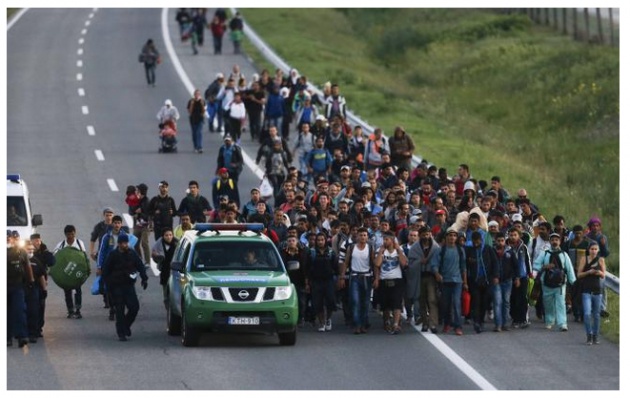
Scores of migrants broke through a police line near a refugee centre on Monday and marched against oncoming traffic on a motorway hard shoulder headed for Budapest while police in southern Denmark late Monday closed a motorway as groups of refugees marched towards the border with Sweden, known for its more generous asylum policies, reports AFP.
The group of around 200 walked some 15 kilometres (nine miles) along the M5 motorway before police negotiators persuaded them to board buses to take them back to a nearby registration camp for asylum-seekers.
Police earlier closed a section of the motorway near Roszke in southeast Hungary close to the Serbian border after the group climbed over a barrier and onto the road, which leads to the capital.
The migrants were part of a 1,000-strong crowd who had earlier pushed past a police line at a refugee collection point at Roszke—the first stop before people are brought to the registration camp.
There were scuffles throughout Monday as migrants chanting “Freedom!” protested at having to wait for hours in the open for buses to take them for registration.
Clashes have broken out between police and migrants, sick of the long delays at the overcrowded refugee collection and registration camp at Roszke, the main crossing point for the thousands of people who have been coming into Hungary every day for the last month.
Police fired tear gas at migrants after some threw stones at officials at the registration camp on Friday.
Some 300 migrants had escaped from the camp earlier, forcing the authorities to close the main border crossing with Serbia for around an hour, although they were later caught by police.
Around 167,000 migrants have entered Hungary illegally so far this year, with most crossing the border around the Roszke area.
Last Friday, among a raft of anti-migrant laws approved, Hungary’s parliament voted to criminalise illegal border crossing, with the ruling expected to come into force September 15.
Dfgdhdj
Police in southern Denmark late Monday closed a motorway as groups of refugees marched towards the border with Sweden, known for its more generous asylum policies.
“This is being done for the safety of the people who are walking along the motorway,” local police said in a statement after closing the first 29 kilometres (18 miles) of the road from Rodby harbour in southern Denmark to Copenhagen.
Earlier in the day, up to 150 refugees began marching towards the border but many later agreed to be taken to police stations to register for asylum in Denmark.
They were among around 300 refugees who landed Sunday in Rodby, which has Scandinavia’s busiest ferry crossing to Germany.
But scuffles broke out with police when some ran off to avoid having their fingerprints taken in fear they would be registered as seeking refuge in Denmark and unable to go on to Sweden, where many said they had family.
Prime Minister Lars Lokke Rasmussen said at a Monday press conference that around 400 refugees had entered Denmark over the past 24 hours but doubled that number to 800 a few hours later.
“We cannot just ignore our obligations and send them to Sweden without its consent, because then we would be doing the same as many other countries, which is the reason the European asylum system is under massive pressure,” he said.
As more refugees arrived in Denmark’s south there were also more people taking to the roads to walk towards Sweden, which asylum seekers typically reach by taking the train across a bridge linking Copenhagen and the Swedish city of Malmo.
The bridge is not open to pedestrians.
Many of those walking on the motorway raised their hands as they shouted: “Malmo, Malmo, Malmo,” the Politiken daily wrote.
Around 100 Danes had gathered on a bridge crossing the road to hand out food and diapers to the walkers, who had only covered a fraction of the 160 kilometres between Rodby and the capital.
Laila Saied, an engineer from Syria, said she had travelled through Europe with her husband and two children for one month in the hope of reaching Sweden.
“I slept on the street, I was on the sea with my children,” she told broadcaster TV 2 News earlier in the day.
Prime Minister Rasmussen said he had told German Chancellor Angela Merkel that Denmark was willing to accept 100 refugees from Germany “given the very special situation Germany and Europe is in.”
While Sweden has become a top EU destination for refugees by issuing permanent residency to all Syrian asylum seekers, Denmark has sought to reduce the influx by issuing temporary residence permits, delaying family reunifications and slashing benefits for newly arrived immigrants.



